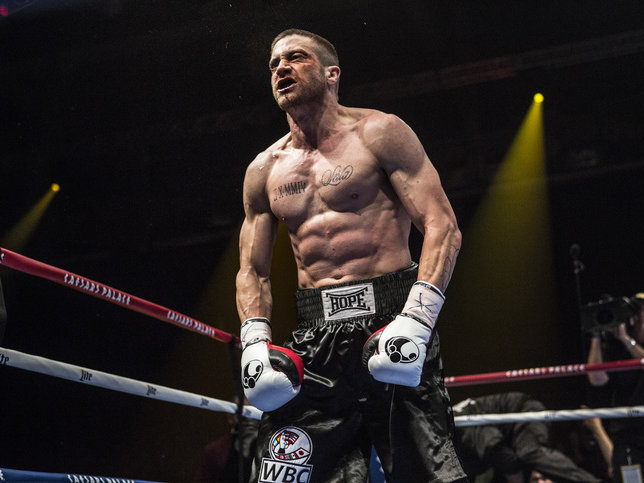The last time audiences saw Jake Gyllenhaal, he was playing the gaunt media parasite Lou Bloom in "Nightcrawler," his character’s reportedly 147-pound frame barely able to scrape away from a messy fisticuffs with a rent-a-cop. Cut to almost a year later to the new boxing drama "Southpaw," and, well, see the above photo.
Between films, Gyllenhaal packed on a toddler’s worth of lean muscle mass – 28 pounds, to be more precise – giving himself abs that have freaking abs and giving the pre-release interviews seemingly the only talking point they’d need. Starting with the first meaty press still unveiled last November, most of the attention has zeroed in on Gyllenhaal, his ferociously ripped new look and the intense regime that got him there (as it turns out, a lot of working out. And Chipotle).
Part of the crazed attention to Gyllenhaal’s pumped-up appearance comes from the studio – Weinstein Company, in case the motives were in doubt – and its attempts to position Gyllenhaal for some early Oscar buzz. After all, boxing movies are usually catnip for awards buzz – second only to physical transformations, since "commitment" and "acting" are often confused for synonyms.
The other part, however, is also likely because, well, there’s just not all that much to say about the actual movie housing that handsome new physique. Have you seen a boxing movie before? Well congratulations, because then you’ve also pretty much seen "Southpaw." That’s not to say it’s entirely ineffective; there’s just not much here other than the cardboard cutout of a boxing movie, draped with slabs of meat and cinderblocks in the hopes extra grit and machismo will help the predictable man weepie resemble something bigger, stronger and faster.
In a role originally written for Eminem (the rapper now just provides the song "Phenomenal," the movie’s equivalent to "Gonna Fly Now") Gyllenhaal plays champion boxer Billy Hope, riding high after yet another title bout win. He’s got his belt. He’s got his beautiful, concerned but doting wife Maureen (Rachel McAdams) and an adorable kid (Oona Laurence). He’s got a huge mansion and enough money to buy each of his crew members fancy watches. Yes, life is pretty swell for Billy – other than the fact that his hard-headed wild-man fighting style involves taking so many punches that he can’t take off his own socks without help after a match and blood keeps oozily dribbling from his mouth.
Those problems, however, quickly become a moot point after a public scuffle with a rival (Miguel Gomez) ends with catastrophic consequences, unhinging Billy and his idyllic life. He loses Maureen. He loses his kid. He loses his title – and his cool – in the ring. He loses his mansion and eventually the rest of his possessions and money. That’s what happens when your deceitful manager is played by now actually bankrupt 50 Cent, who quickly bails too, leaving Billy Hope without … oh, I see what you did there, "Southpaw." His last chance at recovery is Tick Wills (Forest Whitaker), a grizzled old trainer sparring with his own set of demons. He gets Billy a job at his gym and together they get Hope back on his feet and back in the ring, fighting his old rival for his family and redemption.
Director Antoine Fuqua ("The Equalizer") and "Sons of Anarchy" creator Kurt Sutter's script do not spare any despair belaboring Billy’s self-destructive demise. They absurdly and immediately drop floor after floor out from under Billy’s penthouse life until he’s in the dirt – and then open the earth up, dropping Billy down to the lower mantle. From legal, professional and personal woes, no melodramatic or trite low goes unturned in "Southpaw." With even a slight touch of deftness, Billy’s fall and rise might’ve played more real, but Sutter’s relentlessly overwrought approach is just too much trying too hard.
Unfortunately, the script’s as clunkily blunt and heavy-handed with the dialogue as it is with the plotting. The scripted boxing announcers hit every expositional point as hard and as repeatedly as a speed bag and, and in case a character named Hope wasn’t spelling things out clear enough, there’s a scene where Billy’s little girl literally spells out the word "hopelessness." Drunken right hooks have more nuance. Add in Fuqua’s stern-faced grim and gravelly approach to the material, and "Southpaw" feels like it’s trying just a bit too hard to be the ultimate man’s redemptive underdog boxing movie.
It doesn’t help that all of that overly weighty melodrama comes delivered on well-worn sports movie clichés. Boxing movies aren’t exactly a beacon of originality, but the best new ones – "The Fighter" or even "Warrior" on the MMA side of things – find new tweaks amongst the familiar beats. "Southpaw" hints at some of that – Bobby’s deteriorating mental and physical state, the titular oddball southpaw status – but hint gives them more credit than what they actually add up to.
Instead, Sutter and Fuqua stick with the predictable clichés. The closest thing the film has for a surprise comes barely 30 minutes in (or 50 seconds into the overly generous trailer). Otherwise, from frame one, it’s easy to see exactly where the movie’s going and what beats it’ll hit along the way; the only question is how hard it’ll hit them (hint: HARD).
Of course Billy hits rock bottom, and of course his money-grubbing former manager will end up with his rival, who of course he must fight at the end (oddly the movie doesn’t bother to make them anything more than bland villains). Of course Whitaker’s new trainer is world-weary and broken as well, requiring the pupil to become professor in the subject of healing. And do you have to even ask if there’s a rousing training montage? The film dishes out predictable clichés the way Billy boxes: a tactless, brute force object hoping to pummel its audience into sensory defeat.
At least the clichés and tropes are well performed. While he leans a little heavy on the mumbles (he’s apparently the only modern boxer with no sense of braggadocio) Gyllenhaal sells the broken bruiser’s self-destructive fall and rise from the ashes successfully. Even when the script lays on almost ridiculous amounts of pain and weight on his character’s shoulders, he plays it well, his eyes giving glimpses of the sensitive wounds under his seemingly tough skin. That’s without mentioning, yes, the impressive physical commitment as well, convincingly turning into a bulky boxer on screen both in his fitness and his bloody form in the ring.
Perhaps Gyllenhaal’s best attribute – going back through his performances in "Zodiac," Prisoners," "End of Watch" and "Nightcrawler" – is that he shares the screen well with others. He builds genuine chemistry with his co-stars, and his scenes with Whitaker in "Southpaw" are no different. On a basic level, it’s simply nice to see Whitaker have a character worth a damn (remember when he won Best Actor?) but the movie’s really at its best in that back half when the two leads are on screen together, sparring and eventually bonding. It’s not a new relationship arc by any means, but Gyllenhaal and Whitaker fill it with some real life and humanity.
And, luckily for "Southpaw," there’s a reason why those boxing movie and sports clichés have lasted through the ages: They work. Even in this civil and concussion-wary era, unless your boxing movie is an utter dumpster fire, there’s still something about two dudes settling their disputes and finding personal and professional triumph in the ring that gets the blood pumping, and "Southpaw" is no different. The final fight, while lacking in much character, hits its tense and crowd-pleasing notes well enough to summon some cheers. Just like "The Equalizer" last year, Fuqua doesn’t bring much special or extra out of his standard plots, but he knows how to wring their familiar genre pleasures for what fun if forgettable thrills they still hold.
The audience walks in expecting those big, enjoyably predictable notes, and by the time the credits roll on "Southpaw," they will have gotten them. But in between, there’s just so little other than those trite clichés and a thick layer of manly grit and authenticity hoping to pass them off as something new or interesting. For all of the blood, sweat and spittle flying through the air, the most common thing coming off the characters and storyline is dust. It’s all toughness, sinew and muscle overcompensating for a thin, tired skeleton underneath. Gyllenhaal may have buffed up, but now it’s "Southpaw" that resembles his scrawny character from "Nightcrawler" – just maybe wearing an Ed Hardy shirt.
As much as it is a gigantic cliché to say that one has always had a passion for film, Matt Mueller has always had a passion for film. Whether it was bringing in the latest movie reviews for his first grade show-and-tell or writing film reviews for the St. Norbert College Times as a high school student, Matt is way too obsessed with movies for his own good.
When he's not writing about the latest blockbuster or talking much too glowingly about "Piranha 3D," Matt can probably be found watching literally any sport (minus cricket) or working at - get this - a local movie theater. Or watching a movie. Yeah, he's probably watching a movie.







